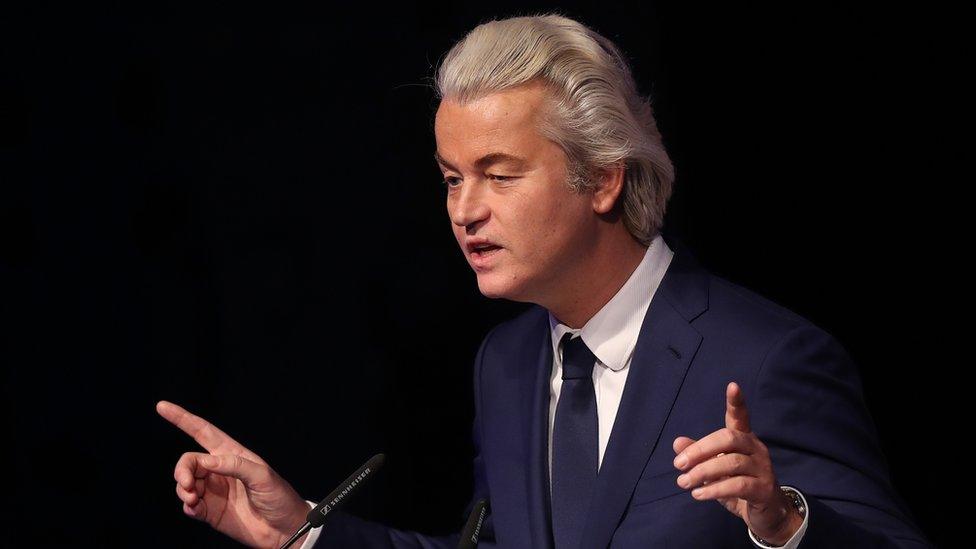Dutch election turns spotlight on Moroccans
- Published
Meet the Dutch-Moroccans at the centre of an election campaign
When Dutch populist leader Geert Wilders accused young Moroccans of making the streets unsafe, they were thrust into the centre of his election campaign.
As the 15 March vote approaches, the founder of the anti-immigration Freedom Party (PVV) has faltered in the opinion polls. But Dutch Moroccans, who make up just 2% of the population, have continued to feature prominently in the election debates.
With her trendy black trainers and matching hijab, Hafsa Mahraoui is the quintessential image of modern Muslim woman. She considers herself "a true Amsterdam girl" but has been disappointed by the tone of the campaign.
"They say Islam isn't normal, it doesn't belong in Dutch society, and that being hijabi means I am an oppressed person," she says.
"It's tiring because we are always in the spotlight and you have to defend yourself. Amsterdam is a big city, there are 180 nationalities here. They talk about a (Dutch) culture, but when I look around I don't see it."
More stories about the Dutch election race:
Hafsa shudders as she recounts having her headscarf ripped off just after the murder of the film-maker Theo van Gogh. He was shot dead by a Dutch-Moroccan man while cycling to work in 2004, a pivotal moment largely seen as hardening Dutch attitudes towards Islam.
In a renovated drug den in the edgy district of Amsterdam North, rapper Rachid el Ghazoui - who goes by the name of Appa - explains how he started growing a beard and became interested in radical Islam, because he was "angry with how society treats us".
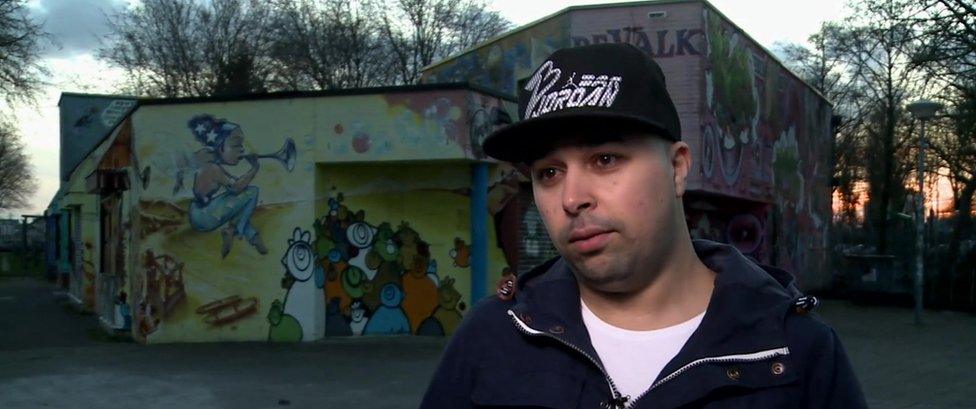
Rapper Rachid el Ghazoui says politicians have heightened tensions
Then he learned to channel his frustrations through music and is now helping other young people to do the same.
"The PVV is big in this country; they hate us, they hate Muslims. But a lot of Dutch people are scared too," he says. He believes Prime Minister Mark Rutte has also heightened tensions by suggesting that people who refused to adapt to Dutch values should leave.
"There's a lot of fear and hate created by politicians who just want votes, and it makes it a little difficult for you as a Moroccan youth."
'Dutch Trudeau'
Neither Geert Wilders nor the prime minister took part in one of the key TV debates, and that enabled other political leaders to seize the limelight.
One of them, Jesse Klaver, is part-Moroccan.
With his shirtsleeves hitched up, a charismatic twinkle and shaggy hairstyle the 30-year-old father of two is attracting new voters to the Green Left (Groenlinks) party with a progressive, inclusive attitude, quite at odds with Geert Wilders' anti-Islam, anti-immigration rhetoric.
Jesse Klaver has become such a hit that he has already "sold out" a 6,000-seat hall in Amsterdam. And supporters are comparing him to Canada's Prime Minister, Justin Trudeau.
Born to a Moroccan father and Dutch-Indonesian mother, he speaks openly about how his dad walked out on the family when he was a child. His speeches unashamedly draw on campaign themes once used by Barack Obama.

Who's who in Dutch election

From L-R: Centre-right PM Mark Rutte, Populist Geert Wilders, Christian Democrat Sybrand Buma, Liberal Alexander Pechtold and Green Left Jesse Klaver
A record 28 parties are contesting the 15 March election; five are jostling for the biggest number of seats
Mark Rutte's conservative liberal VVD currently leads in the opinion polls and refuses to go into coalition with Mr Wilders' PVV
Also riding high in the polls are the Christian Democrats, Liberal D66, Green Left, the Socialist SP and Labour
Dutch governments are formed by coalitions - the last featured the VVD and Labour party (PvdA)
The Dutch App that lets you keep politicians as virtual pets

Seeking to kick-start his flagging campaign, Geert Wilders' first stop last week was Volendam.
'We don't like it'
The small fishing village famous for its eels is only a 20-minute drive from the graffiti-covered Amsterdam youth club, packed with the children of immigrants perfecting their rap skills.
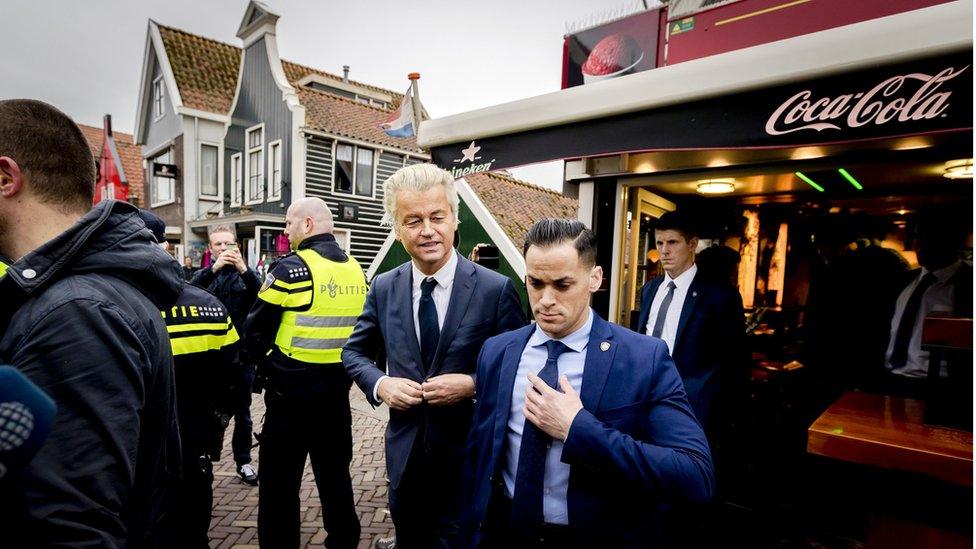
Geert Wilders visited Volendam last week, after pausing his street campaign for security reasons
The waterfront high street is almost deserted and feels like Disneyland out of season.
Volendam presents a vision of the Netherlands sought by tourists, and in the 2014 European elections almost one in two of its voters backed Mr Wilders' PVV.
A waitress serving a thick slice of apple tart says she is fed up with being associated to what she describes as a racist party. "It's only the old people voting for Wilders now. We don't know what he's doing, and we don't like it."
Volendammers were particularly offended when a national newspaper published a cartoon featuring villagers in traditional costume with their faces superimposed with an image of Adolf Hitler.
Viral videos
Geert Wilders has clearly hit some sort of snag in the past fortnight.
It may have been his decision to avoid mainstream media. He may also have been damaged by TV satirist Arjen Lubach's decision to train his eye on the Wilders manifesto.
Lubach has gone viral before, when his TV programme reacted to President Donald Trump's America First policy by asking "but can we just say the Netherlands second?"
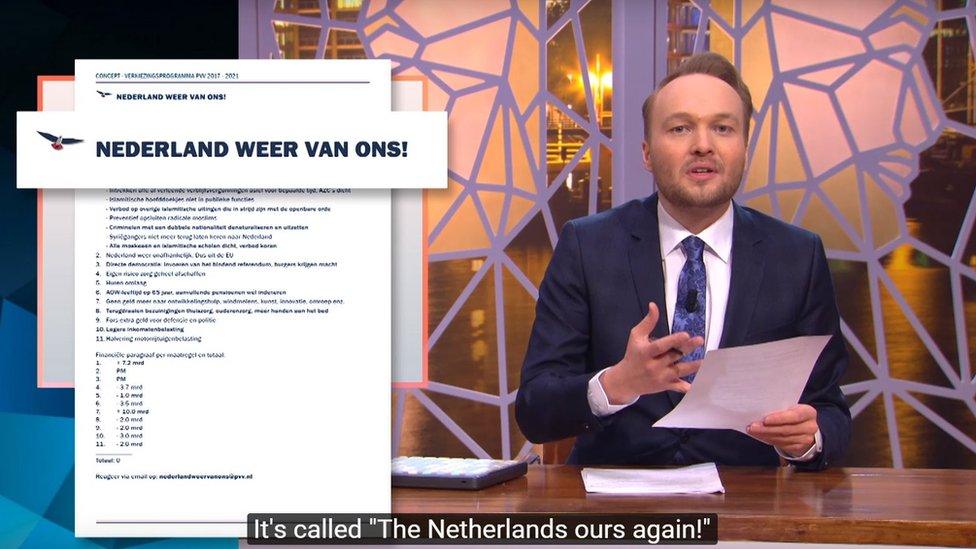
Arjen Lubach's Sunday night TV programme has become must-see viewing ahead of the vote
"The biggest problem is they have this one sheet of paper explaining what their plans are," the satirist told the BBC.
"No matter where you look, it's just one piece of paper. Among the things they want, closing all mosques, forbidding all Korans. How?! Because you'd need to take freedom of speech out of the constitution, you need to take freedom of assembly out of the constitution.
"You'll get into fights with the whole world. I mean it needs some explanation and that goes for almost anything that Geert Wilders is saying."
A video of the segment has attracted well over a million views. And an accompanying hashtag "How then?" trended on Twitter.
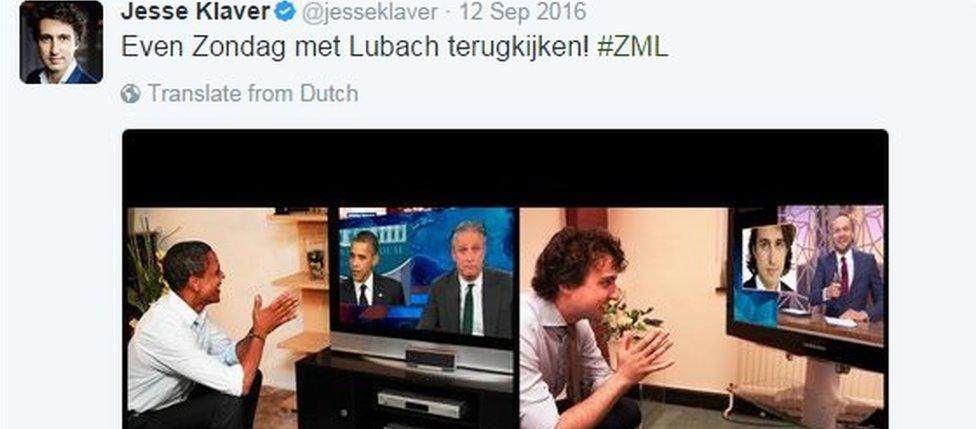
Arjen Lubach, whose show has been compared to Jon Stewart's old Daily Show, also tore into Jesse Klaver's tendency to use Barack Obama-style rhetoric
But Lubach does not just single out Geert Wilders. In another widely shared video, external, he showed how Green Left's Jesse Klaver drew heavily on the rhetoric of Barack Obama during his 2008 presidential campaign.
"Het kan wel," Jesse Klaver promises a crowd in his own Dutch version of "Yes we can".
When the Green Left leader addresses a US-style rally in Amsterdam this week, commentators believe its scale will be unprecedented in the Netherlands. The party is using a marketing firm hired by Barack Obama and Bernie Sanders - and it shows.
Jesse Klaver's team does not object to the association. And it does not seem to be doing him any harm.
- Published7 March 2017
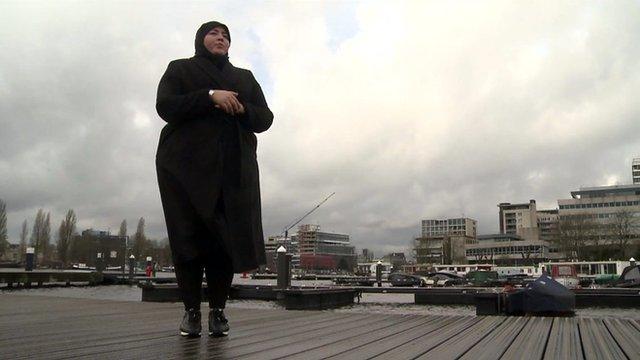
- Published13 February 2017
- Published1 February 2017
